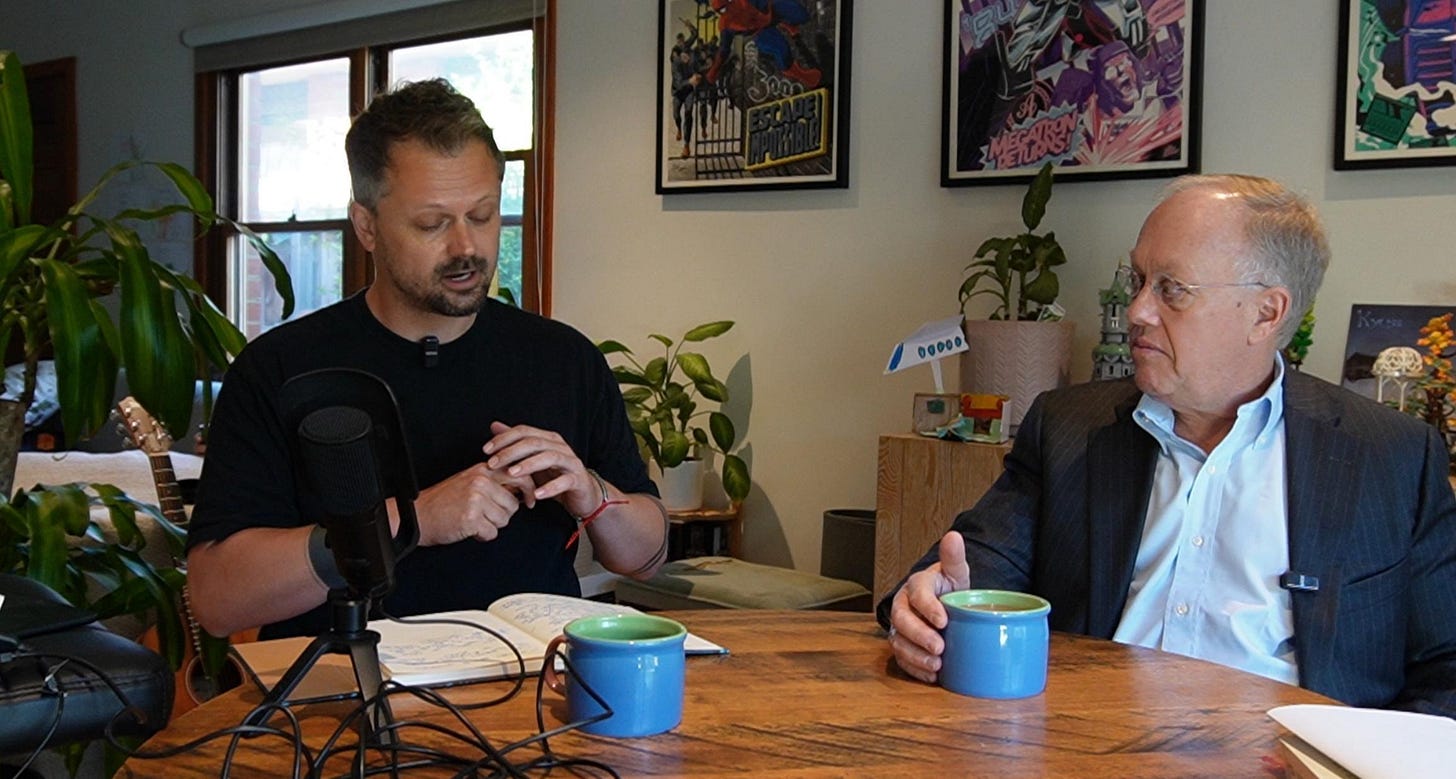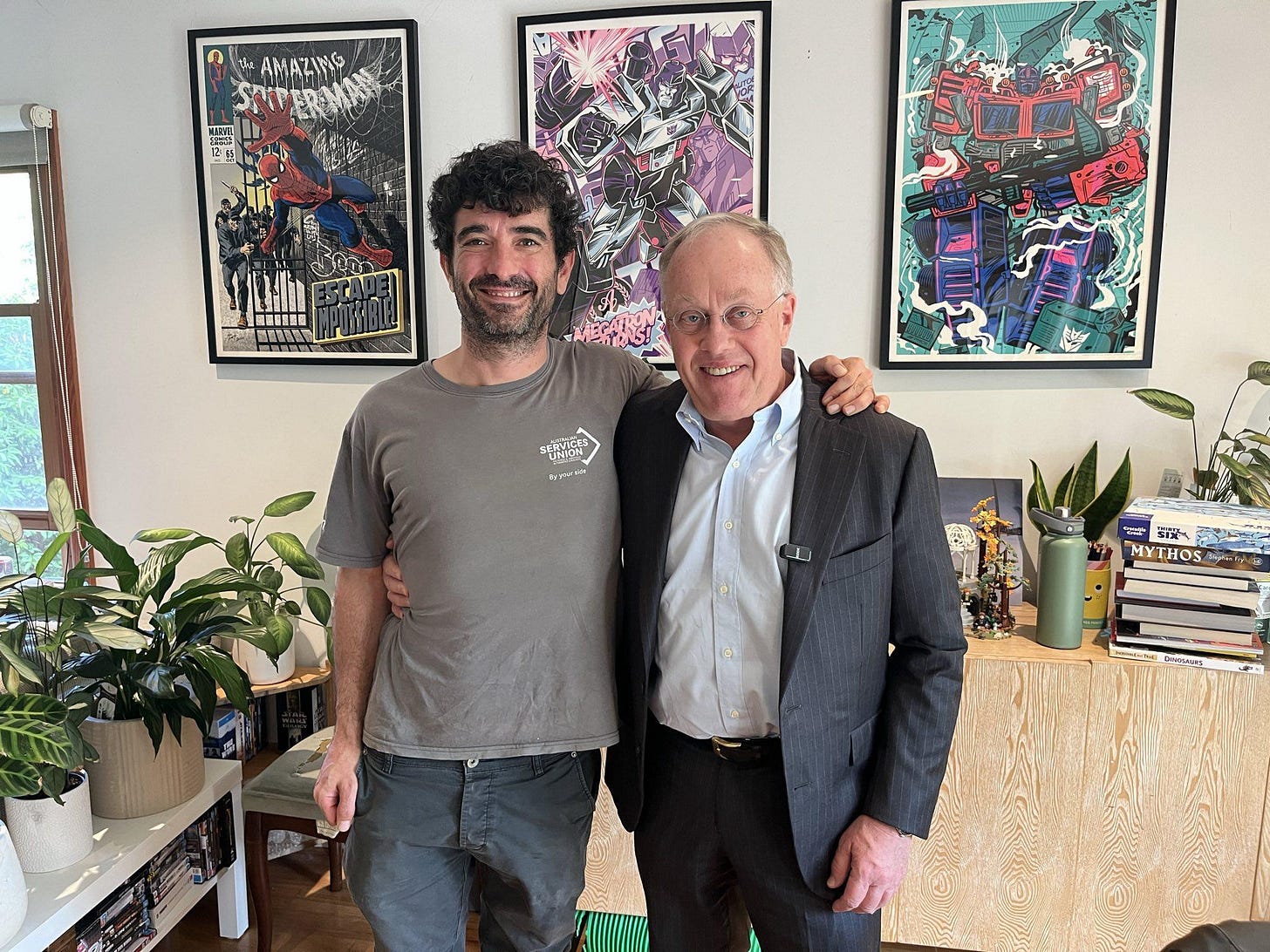Chris Hedges NPC Ban Holds a Mirror to the Decay of Australian Discourse
The Nation Press Club has decided that it will choose (and unchoose) the journalists that come to Australia, and the circumstances in which they come.

Pulitzer Prize winning American Journalist Chris Hedges is rounding up an Australian tour to much public fanfare, but little national recognition. The acclaimed writer, one of the great living Western journalists, was removed from a speaking engagement at the National Press Club in Canberra only days before his visit.
Hedges is an illustrious guest, and was preparing to address the National Press Club as a part of a national tour on the plight of journalists in Gaza. The decision has caused public outcry from Australians who are fans of the legendary journalist, and those who are worried about the seemingly endless pressure to censor and restrict people taking about anything to do with Gaza or narratives critical of Israel. Without an Australian media outlet prepared so much to acknowledge his presence in the country, nor a legacy journalist prepared to interview him, Hedges’ only interview in Australia was conducted by Dave Milner, with production limited to an iphone, a bunch of cables and a bogan (yours truly) filming the whole thing.
It was with an almost uncanny surreality to hear Chris Hedges knocking on the back door of the slightly cluttered single dad residence of ‘The Shot’ Editor, Dave Milner. Among a Kyuss record, a Lego Lord of the Rings Rivendale set, and Optimus Prime posters in the background, one of the most accomplished living journalists gave an interview in the same high fidelity that he would at an Ivy League university. Truth is, we are still kicking ourselves at the fact that we were put in this position, and ever grateful for it – but the fact that a man with the international reputation of Hedges is not welcome in legacy Australia says more about the sad state of journalism in this country than it does about him.
Chris Hedges is once in a generation figure in Western intellectual circles. Hedges has dedicated his career to something far more than money or fame, standing out as an industry exemplar, and a blinding light to the journalistic vampires who now skulk in the shadows of its once illustrious temple. Hedges was cancelled for his courage and his willingness to do his job as per the description, two traits that define his character and forge his legacy, and two virtues that see him forge ahead despite the consequences.
After decades as a war reporter in flashpoints around the globe, this courage and infallibility to the integrity of his profession would see Hedges end his illustrious mainstream career at the New York Times over his opposition to the Iraq war. At a time where the bulk of journalists were willingly commandeered as propagandists to steer narratives that promoted the burgeoning global war on terror, it was Hedges that stood with a small cohort of esteemed journalist’s who fought against the propaganda and the lies that would lead to one of the most devastating conflicts the Middle East has ever experienced, the reverberations of which we still see today in places throughout the region and beyond.
His journalism is stark and cutting, his writing filled with layers of care, combos of anger, packed with supporting strands of hand-picked nuance, exemplified by his ability to share experiences with people around him in the areas he worked. His honest Presbyterian style, meant that the former Harvard divinity school student made connections with communities like a parish priest, always working, always available to talk. He speaks in the style of a sermon, and writes lines that cut into the soul of the reader, bringing a journalistic integrity that the Canberra press gallery could have learned a thing or two from. Shame that only me and Dave got that lesson in Dave’s lounge room.
Although Hedges’ journalism is some of the most significant and impactful in the industry, it is his observations on the decaying human condition within American society that truly captures his mastery as an anthropological, sociological and spiritual analyst. In the deteriorating and neglected vacuum between the widening gaps in US Social Security nets, the breakdown across society through drug epidemics and corporate rapaciousness meted out by those elected to protect people - Hedges makes his observations about the nature of US society through a lens developed over a impressive career. His career spanning decades from Sarajevo to El Salvador, provided him a lens through which to analyse his home in the United States, drawing on alarming similarities between societies on the verge of collapse and his own.
It was with all those accolades, the ubiquitous global consensus on his pedigree and skill, the pertinence of the subject matter and the intended recipients of the address (Australia’s underwhelming legacy media), the NPC claimed a slew of hard-to-believe rationales for why it pulled Hedges. After a statement claiming it had a sliding schedule and Hedges was never advertised on the website, Hedges, a journalist, perhaps in transit finding out about the cancellation, found information quite quickly that was to contrary, posting a screenshot of the national Press Club website promoting the event before they took it down.
“The National Press Club of Australia recently cancelled my scheduled speaking event, which would have covered the Western betrayal of Palestinian journalists. The NPC claimed that my cancellation had nothing to do with “pressure from anyone outside the board, either directly or indirectly”... “yet, it’s important to note that the NPC is sponsored by multiple defence contractors who provide military infrastructure to Israel, including Raytheon, BAE Systems, and Thales.” – Chris Hedges
If the Press Club was functioning as intended, you would think delivering pertinent guests like award-winning journalists delivering information on the plight of journalists, on a platform run by journalists, might fit the bill. But in the post Francesca Albanese Aussie press environment, where Australians seem more fearful of scoldings from foreign guest speakers at the NPC than they do the repercussions of inaccurately and subjectively reporting a genocide for their pro-Zionist platforms, Australian journalists couldn’t be more disconnected from the trade-craft Hedges promotes, and seemingly couldn’t be more apathetic towards the 270+ journalists that have been killed in Gaza.
More Journalists have been killed in Gaza in the last two years than the US Civil War, both world wars, Vietnam, Yugoslavia, both Iraq wars and Afghanistan combined. That’s what Hedges was going to address the Australian media about: the mass targeting and death of journalists. In Chris Hedges cancellation, there is something about all of this that is absurd in all its reality, something abjectly terrifying about the people who claim to inhabit our media space as journalists, when they are all but stenographers for proto-authoritarianism. The media cohort in this country are terrified of Chris Hedges, for the leagues of moral and ethical seas that separate them, for holding up a mirror, for demanding they look at it.
This is the state of discourse in Australia, where our concentrated media and the journalists who are comfortable within its tight grasp, wrapped in the cotton wool of engineered narratives and sycophantic to corporate decrees, are sponsored directly by the military industrial complex who feed weapons into the killing fields around the world. What state has this country come to when its journalists openly and proudly display their sponsors; transnational weapons merchants, while openly censoring and abandoning their comrades? Real journalists, whether esteemed writers from the United States, or buried journalists in Gaza, are not valued in the land of #auspol.
A country devoid of good ideas, where people who care about things too much can be shunned by the tall poppy syndrome that dominates the national character and acts as a cudgel that beats the aspiration out of us, perhaps the NPC thought that Hedges was a rather obscure guest that wouldn’t be missed. But after a decade or so of a failure to receive information within their own country, and the lack of voices like Hedges within our own shallow and anti-intellectual national discussion, Australians have left the legacy umbrella and found writing from people like Hedges in the deep, wide ocean of the internet. Small wonder then that the Australian government is so keen to constrain and control it.
Chris Hedges was sorely missed at the NPC, but not by the people who claim to champion it.
In our wider society, we have been subject to a disingenuous political class who played both sides on a genocide, pulled along by a disproportionately powerful lobbying group supported by a disproportionately powerful business class and a disproportionately concentrated media. People like Hedges are too dangerous now for an elite that made a decision where they want to stand in history, in our name, and they have chosen not to allow people like Hedges to cast any more light on their dark agenda.
If a Pulitzer Prize winning Journalist from the United States, one of the most esteemed in the profession, someone with a charitable heart, and a poetic touch, who exemplifies the essence of the tradecraft, can be discarded from the bastion of Australian media credibility, then what does that say about all the people who work in that industry? By virtue of association, what does that say about all of us?



Chris Hedges is a wise man speaking the truth and what a rare experience that is right now. Why is this so? How did we get to this? (Just rhetorical questions, we know why). Shame on the NPC, backed by weapons manufacturers; and how much did the Zionist lobby have to do with this?
Thank you Joel and Dave for doing this interview with Chris Hedges. It was both inspiring and despairing, prodding us into keeping on going and standing up for Palestinians and all those oppressed by imperialism.
Chris Hedges isn’t so much a journalist but a prophet shunned by so-called polite society as it turns away from the simple truths of humanity.